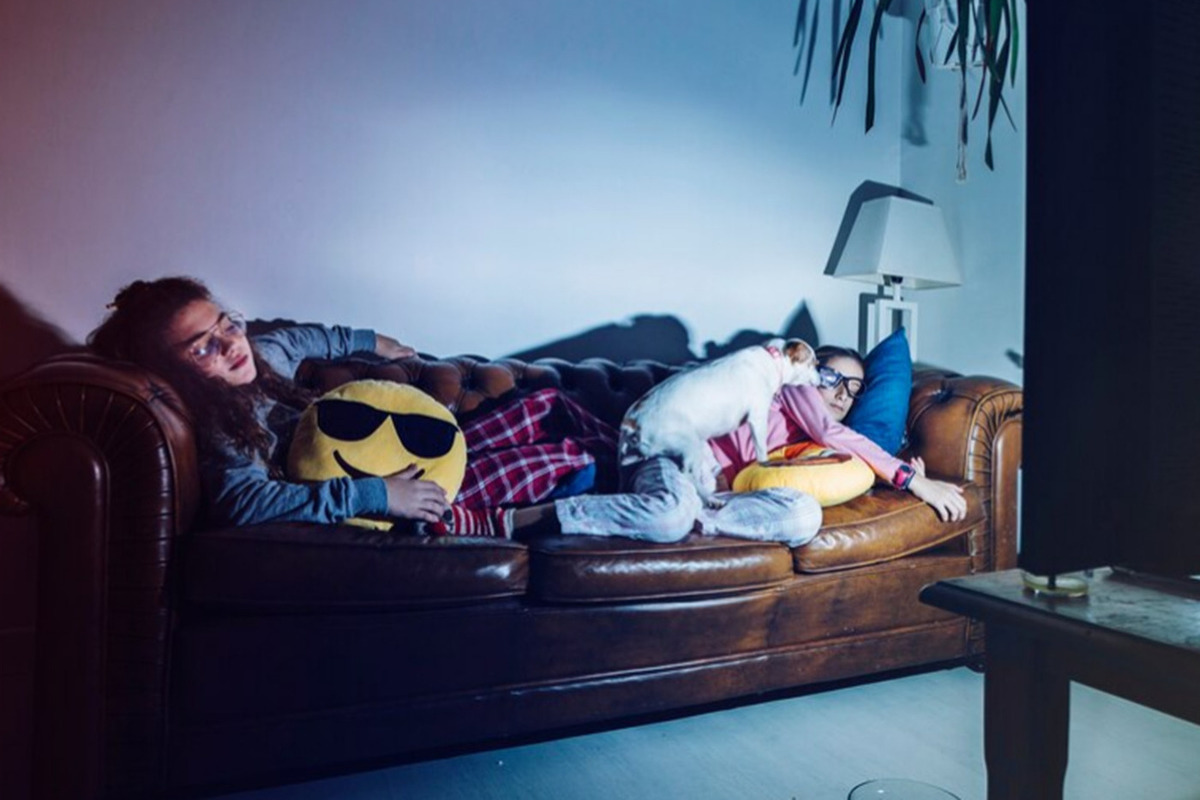A link has been found between watching TV and going to the toilet at night.
[ad_1]

Many people knew that watching TV for a long time affected their health, but they didn’t even suspect how bad it was. The latest issue of the journal Neurourology and Urodynamics published the results of a new study, from which it follows: if an adult spends five or more hours a day watching TV, he is significantly more likely to run to the toilet at night. And this, in turn, increases the risks of developing diabetes, metabolic disorders and (in men) erectile dysfunction.
Sitting down and watching TV drama may seem like the perfect way to relax, but researchers have found that people who spend long periods of time in front of the box are more likely to have to run to the toilet several times a night.
A new study has found a link between watching TV during the day and urinating at night. It (urination) noticeably increases in those who look at a blue screen for a long time: up to several times during the night. Such frequent trips to the toilet at night are medically called nocturia.
Chinese scientists analyzed data from the National Health and Nutrition Examination Survey of Americans for 2011–2016. Among 13,294 US residents aged 20 years or older, 4,236 (31.86%) reported having nocturia (that is, urinating 2 or more times per night), and 9,058 (68.14%) – No. Taking into account factors such as age, gender, body mass index, ethnicity, education level and whether people have diabetes, the researchers found that the risk of nocturia was 48% higher in those who spent five or more hours watching TV in day than those who watched it for less than an hour daily. For those who are content with two hours a day, the risk increases by 32%. People who spend less than an hour a day watching TV are 10% less likely to get enough sleep due to needing to empty their bladder. High blood pressure, diabetes and prediabetes, high BMI (body mass index), low level of education and female gender are additional risk factors.
“To our understanding, this study represents the first to examine the correlation between TV viewing time and nocturia,” the researchers wrote. “For people who spend long periods of time watching television, health professionals can offer behavioral intervention recommendations to encourage good screen time management.”
The research team says the mechanism by which prolonged television viewing increases the risk of nocturia is poorly understood. However, they point to a number of possible explanations for this association, noting that long periods of television viewing are associated with an increased risk of developing type 2 diabetes, which is a risk factor for nocturia, while a sedentary lifestyle is associated with fluid retention in the legs, which may also contribute to nocturia. Along with diabetes, the risk of developing erectile dysfunction in men also increases. “In addition, television viewing is usually consistent with the consumption of beverages, leading to increased fluid intake,” the authors write, adding that, among other things, prolonged television viewing can lead to neurological disorders that can cause bladder dysfunction, and that Watching TV can affect sleep duration or quality. And a decrease in sleep quality is closely related to the occurrence of nocturia. Other explanations, more complex (and less convincing), link prolonged viewing of movies and TV series to neurological disorders that can impair bladder function, as well as increased systemic inflammation, which is also a risk factor for nocturia.
Previous studies have shown that nocturia not only impairs quality of life and sleep, but also increases the risk of falls, fractures and cardiovascular events. Studies have also shown that watching television for long periods of time has negative health effects, such as reducing sleep duration or poor quality sleep (which, as already mentioned, is closely linked to the occurrence of nocturia).
The study authors believe doctors and health care providers should educate their patients about this connection: “Increasing public awareness of this potential health risk is encouraging people to be more mindful of their television viewing.”
However, doctors see a number of shortcomings in this study. As endocrinologist Petr Likhodeev told MK, as a rule, nocturia occurs among older people: “In addition, such patients have a higher body mass index than those who have it within the normal range, and they are also less mobile. Sleep apnea is another risk factor for developing nocturia. The study doesn’t answer the question: Do people get nocturia because they watch TV all day, or do they watch TV all day due to other factors and then just start going to the toilet more often? It should be added that nocturia is quite common, especially among older people, and is not necessarily a cause for concern, although it can occur as a result of cancer, infections or diabetes. If you find yourself walking frequently at night and are concerned about it, see your GP and they will do tests to make sure you don’t have diabetes.”
“Nocturia may not seem like such a big problem, but in reality it significantly reduces quality of life and has a number of serious health consequences, probably because sufferers it causes people to chronically not get enough sleep. So, if you like to stare at the screen in the evenings, try to come up with some alternative hobby. Well, or at least watch TV series, movies, or whatever you watch on an exercise bike or on a treadmill. Perhaps this will help reduce some of the risks associated with prolonged immobility – and again, when you pedal or walk along the path, it’s not so convenient for you to eat, so at the same time reduce the risks of gaining excess weight,” advises the famous biologist Irina Yakutenko.
[ad_2]
Source link








